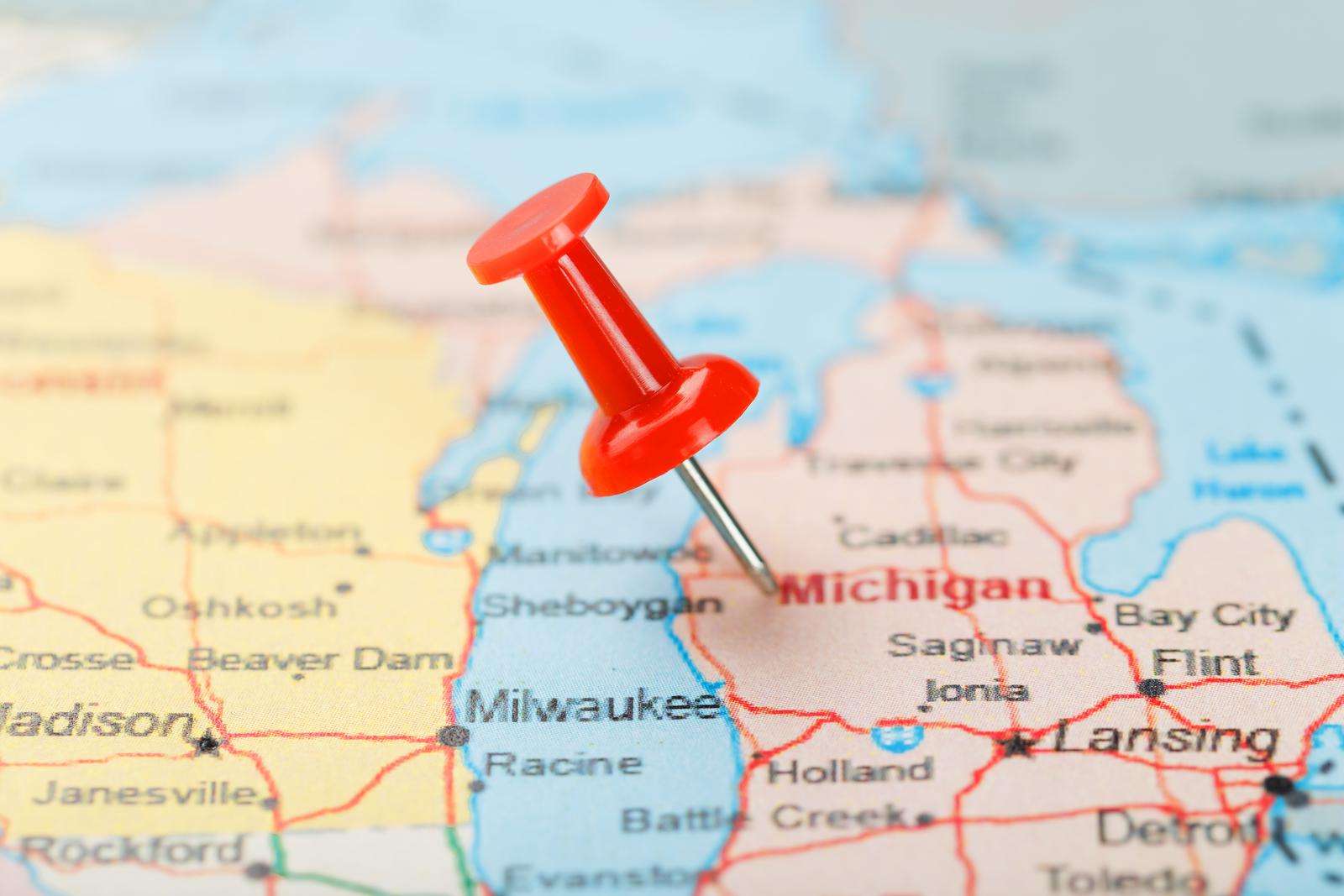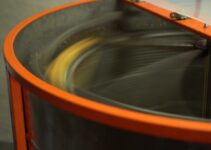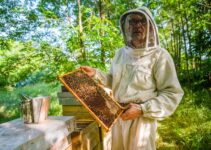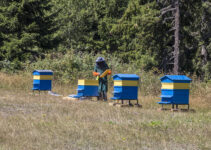Michigan has excellent beekeeping opportunities, and the state laws for beekeepers are not restrictive. This relaxed perspective on beekeeping does not mean there are no laws for beekeepers in Michigan since many of the local municipalities have their own regulations for the practice.
Beekeeping in Michigan has state regulations restricting the export of bees and beekeeping equipment, requiring inspection and certification. Municipal regulations control beekeeping activities in most urban and suburban areas where property zones are the main regulation factor.
Basic state laws and beekeeping guidelines cover beekeeping in Michigan, but the county and city municipal authorities have developed their own regulations based on property use zoning. Beekeepers must investigate local by-laws in their county or city to establish legalities and restrictions for keeping bees.
What Are The Laws For Beekeeping In Michigan?
The state of Michigan, located in the upper mid-west of the United States, in the Great Lakes region, is a good area for beekeepers. The region has hot summers and cold winters, which can be challenging for beekeepers, but the state’s fruit and vegetable agricultural sector generates a need for pollinators.
The wild bee population in Michigan was decimated by the infestation of tracheal mites and varroa mites. Consequently, there are strict laws regarding importing and exporting bees and used beekeeping equipment in and out of the state.
General Beekeeping Laws In Michigan
Beekeeping regulations in Michigan have been relaxed to encourage people to keep bees, which will help maintain a good number of pollinators to service the agricultural sector.
Michigan no longer requires beekeepers to register before keeping bees or have their hives or apiary sites inspected on a regular basis.
Beekeepers are encouraged to follow certain guidelines as best practices for beekeepers and to join the Michigan Beekeepers Association to learn about beekeeping in the state.
Michigan beekeepers are encouraged to join the voluntary BeeCheck program to protect bee colonies from the use of agricultural pesticides.
Bees to be transported out of Michigan must first be inspected and receive a certificate of health from the Michigan Department of Agriculture and Rural Development. There are fees applicable to these inspections and certifications determined by the department.
Most regions in Michigan use a classification system for beekeepers depending on the size of their beekeeping operation.
- Hobby beekeepers: less than 25 bee hives.
- Sideliner beekeepers: Between 25 and 300 bee colonies.
- Commercial beekeepers: More than 300 bee colonies.
Hobby beekeepers do not manage sufficient colonies to be considered an agricultural activity. Sideliner beekeepers usually practice beekeeping as a part of other agricultural activities and will be regulated by agricultural regulations.
Commercial beekeepers are generally classified as an agricultural activity and will be regulated by the appropriate laws.
Generally, these classifications of beekeepers are used to establish the property use of the beekeeping activity and will determine if the beekeeping operation on a property with a certain zoning is allowed. The property zoning regulations are determined by local municipal authorities and not the state.
Siting Regulations For Beekeepers In Michigan
The siting regulations laid out by Michigan state are not laws as such, but rather recommended “best practices” for keeping bees. However, if your bees or your apiary site are found to contravene these recommendations, you may be asked to remove the colonies to a more appropriate location.
- Beehives must not be situated near property boundary lines.
- Bee colonies must not be located near occupied buildings.
- Fences and screens must be used to elevate the flight path of bee colonies in populated areas.
- Hives must not be located near roads or areas of frequent animal or human foot traffic.
- Beehives must not be positioned near any public utility service areas, such as pipelines, electricity infrastructure, or underground cables.
- Beehives must not be positioned where they will cause a problem for schools, public recreation areas, or picnic grounds.
- Beekeepers must provide an easily accessible water source near their beehives.
- Do not keep more than 4 beehives on a property less than ½ acre.
- Aggressive colonies must be re-queened with a queen with less aggressive genetics.
- Bee hives must be worked when disturbing the bees will not cause a problem for neighboring properties.
These recommendations are part of the state Generally Accepted Agricultural and Management Practices, or GAAMPs, which give guidelines for the care of farm animals.
Local Beekeeping Laws In Michigan
Each municipality in Michigan has regulations and by-laws that govern the keeping of bees within their jurisdictional boundaries.
Some areas are more strict than others, but most of the regulations are based on the zoning of the property and whether the beekeeping activity is deemed a hobby or an agricultural activity.
A good source of information for your local municipality codes is Municode, where you can search the ordinances of your district in Michigan to establish the code for beekeeping in your area.
Some examples of local beekeeping ordinances in Michigan are as follows.
Beekeeping By-Laws For Grand Rapids, Michigan
Grand Rapids beekeeping regulations include the restriction that no bee hives must be kept within 150 feet of a school, residence, medical facility, church, hotel, apartment, or any other building of residence.
You may not place your beehives within 100 feet of any property boundary line, and the bees must be closed off with a hedge or fence to force their flight path above six feet unless the hive is located more than 300 feet from the property boundary line.
Bay City, Michigan Beekeeping Regulations
The local ordinance for Bay City’s beekeeping requires a beekeeper to apply for a permit to keep bees on their property. The permit application must be accompanied by written consent from the majority of the neighboring property owners bordering directly on the beekeeper’s property.
An authorized representative will inspect the apiary site prior to the beekeeping permit being issued.
The number of hives is restricted to no more than two colonies, and the property must be a single-family, owner-occupied residence.
A flyway barrier of six feet is required to force the bees to adopt an elevated flight path to the hive unless the bee hive is located more than 300 feet from any property boundary line.
Beekeeping Associations In Michigan
Beekeeping is a popular activity in Michigan, which has resulted in many beekeeping associations being established across the state.
Becoming a member of your local beekeeping association is the best way to remain current with the local beekeeping laws in your area of Michigan.
| Beekeeping Association | Area | Contact Details |
| Northwoods Beekeepers | South Central Upper Peninsula of Michigan | Facebook Page |
| Superior Beekeeping Club | Central Upper Peninsula of Michigan | Facebook Page |
| Copper Country Beekeepers | Houghton, UP Michigan | Facebook Page |
| Escanaba Area Beekeepers | Escanaba, UP Michigan | Facebook Page |
| Grand Traverse Area Beekeeping Club | Northern LP Michigan | Email: grandtraversebeekeepers@gmail.com |
| Little Traverse Bay Beekeepers Guild | Northern LP Michigan | Email: mcmurray.laurie@gmail.com |
| Grand Rapids Beekeepers Association | East Central LP Michigan | Website: https://grbee.club/ |
| Holland Area Beekeepers Association | East Central LP Michigan | Website: http://www.hollandbees.org/ |
| Freemont Area Beekeepers Club | East Central LP Michigan | Website: https://fremontareabeekeepers.org/ |
| Scottsville Beekeepers of Mason County | East Central LP Michigan | Website: http://wws.scottvillebeekeepers.org/ |
| Saginaw Valley Beekeepers Association | West Central LP Michigan | Website: http://www.saginawvalleybees.org/ |
| Seven Ponds Beekeepers Club | West Central LP Michigan | |
| Mid-Michigan Beekeepers Club | West Central LP Michigan | Email: midmichiganbeesec@gmail.com |
| Sunrise Side Beekeepers’ Club | West Central LP Michigan | Facebook Page |
| Battle Creek Bee Club | South West LP Michigan | Facebook Page |
| Michiana Beekeepers Association | South West LP Michigan | Website: http://www.michianabees.org/ |
| Kalamazoo Bee Club | South West LP Michigan | Website: https://kalamazoobeeclub.com/ |
| Beekeepers of Western Washtenaw | South Central LP Michigan | Website: https://honeybeeoww.weebly.com/ |
| Center of Michigan Beekeepers Club (COMB) | South Central LP Michigan | Website: https://combbees.com/ |
| Ann Arbor Backyard Beekeepers | South Central LP Michigan | Website: https://www.a2b2club.org/ |
| River Raisin Beekeepers Club | South Central LP Michigan | Website: https://www.riverraisinbeekeeperclub.com/ |
| U of M Beekeepers Student Club | South Central LP Michigan | Facebook Page |
| Napoleon Bee Club | South Central LP Michigan | Email: napoleonbeesupply@yahoo.com |
| Lost Nations Bee Club | South Central LP Michigan | Website: http://www.lostnationsbees.com/ |
| Middle of the Mitten Beekeepers | South Central LP Michigan | Facebook Page |
| Pine River Beekeeping Club | South Western LP Michigan | |
| South East Michigan Beekeepers Association (SEMBA) | South Western LP Michigan | Website: http://www.sembabees.org/ |
| Maccomb Community College Beekeeping Club | South Western LP Michigan | Website: https://mccbeeclub.weebly.com/ |
| Oakland Beekeepers Club | South Western LP Michigan | Facebook Page |
Conclusion
Not many state laws in Michigan regulate beekeeping as a hobby or commercial enterprise. Most regulations regarding beekeeping are at the municipal by-law level rather than the state level.
This means that beekeeping ordinances vary from region to region in Michigan, requiring each beekeeper to investigate local restrictions for keeping bees.
References
https://www.michigan.gov/mdard
https://library.municode.com/mi




